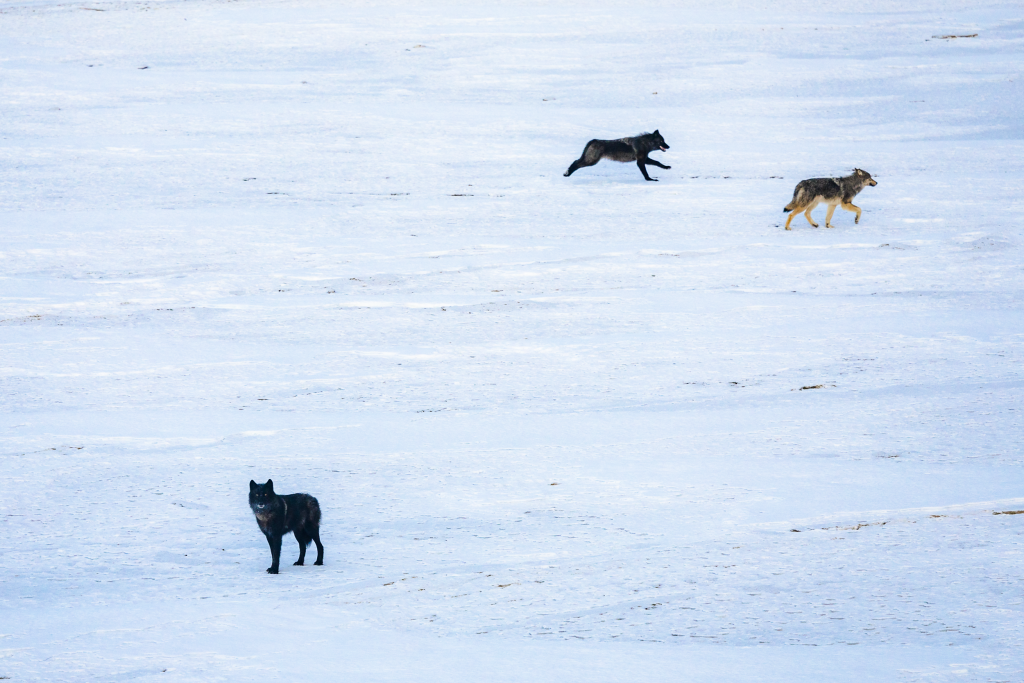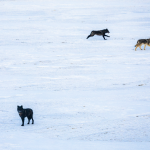Colorado agency denies livestock associations’ claims that Canadian wolves released in mountains violated Endangered Species Act
Colorado Parks and Wildlife noted that gray wolves aren’t considered endangered in the Northern Rocky Mountains or Canada

Colorado Parks and Wildlife/Courtesy Photo
Livestock associations are questioning whether Colorado Parks and Wildlife violated the federal Endangered Species Act when it imported 15 gray wolves from Canada last year.
The livestock associations signed two letters on Oct. 21, requesting records from the U.S. Fish and Wildlife Service related to whether Colorado Parks and Wildlife had the approvals it needed to import the wolves.
“Recent statements from CPW indicate that ‘all necessary procedures were followed’ in conducting these activities,” the livestock associations wrote in the letter to U.S. Fish and Wildlife Service Director Brian Nesvik.
“However,” the letter continues, “given the cross-border nature of the import, the Endangered Species Act and the Convention on International Trade in Endangered Species of Wild Fauna and Flora require specific federal authorizations that only the U.S. Fish and Wildlife Service is empowered to issue.”
Colorado Parks and Wildlife Public Information Officer Luke Perkins said the state worked with U.S. Fish and Wildlife to ensure that the reintroduction efforts complied with the Endangered Species Act.
“CPW has coordinated with USFWS throughout the gray wolf reintroduction effort and has complied with all applicable federal and state laws,” Perkins said.
The letters are signed by representatives of GNL Concepts LLC, Colorado Outfitters Association, Colorado Wool Growers Association, Gunnison County Stockgrowers Association, Southwest Colorado Livestock Association, Colorado Conservation Alliance, Colorado Mule Deer Association, and Colorado Independent Cattle Growers Association.
The letters focus on Section 9 of the Endangered Species Act, which states that it is unlawful for any person to import endangered species into, or export endangered species out of, the United States. The livestock associations claim that federal law would have required a permit from the U.S. Fish and Wildlife Service to import the wolves from Canada.
“Therefore, state agencies such as CPW are explicitly bound by this prohibition and may not import endangered species without federal authorization,” the letter states.
Gray wolves are not considered an endangered species in the Northern Rocky Mountains, according to the U.S. Fish and Wildlife Service. Gray wolves are also not considered endangered or at risk in Canada.
“With respect to sourcing gray wolves from western Canada, it’s important to remember that, like gray wolves in the delisted population in the Northern Rocky Mountains, gray wolves in Canada are not listed under the U.S. Endangered Species Act,” Perkins said. “The provisions of the U.S. Endangered Species Act does not apply to these unlisted populations.”
The livestock associations’ letter also claims that Colorado Parks and Wildlife violated its memorandum of agreement with the U.S. Fish and Wildlife Service by importing wolves from another country and by importing a wolf from a depredating pack in Oregon.
The letter asks the U.S. Fish and Wildlife Service to confirm whether a valid federal permit has been issued to allow Colorado Parks and Wildlife to import gray wolves from Canada, clarify the legal standing of wolves imported from Canada, initiate “corrective action to ensure all future wolf relocations strictly comply” with the Endangered Species Act, and amend or suspend its memorandum of agreement with Colorado Parks and Wildlife until it is in pull compliance.
“If no such import permits were issued by FWS, please confirm that fact in writing, including the legal rationale under which CPW or any other entity acted to import wolves into Colorado,” one letter states.
Brian Nesvik, director of the U.S. Fish & Wildlife Service, sent a separate letter dated Oct. 10 directly to Parks and Wildlife Director Jeff Davis, stating that importing Canadian wolves as part of the state’s reintroduction effort would be violating the 10(j) rule by importing wolves from outside approve areas.
The 10(j) rule allows the designation of populations as experimental if they will be released into suitable natural habitat outside the species’ current range, with certain stipulations. According to Nesvik’s letter, the agreed upon areas included Montana, Idaho, Wyoming and parts of Utah, Oregon and Washington, but not Canada.

Support Local Journalism

Support Local Journalism
The Sky-Hi News strives to deliver powerful stories that spark emotion and focus on the place we live.
Over the past year, contributions from readers like you helped to fund some of our most important reporting, including coverage of the East Troublesome Fire.
If you value local journalism, consider making a contribution to our newsroom in support of the work we do.









